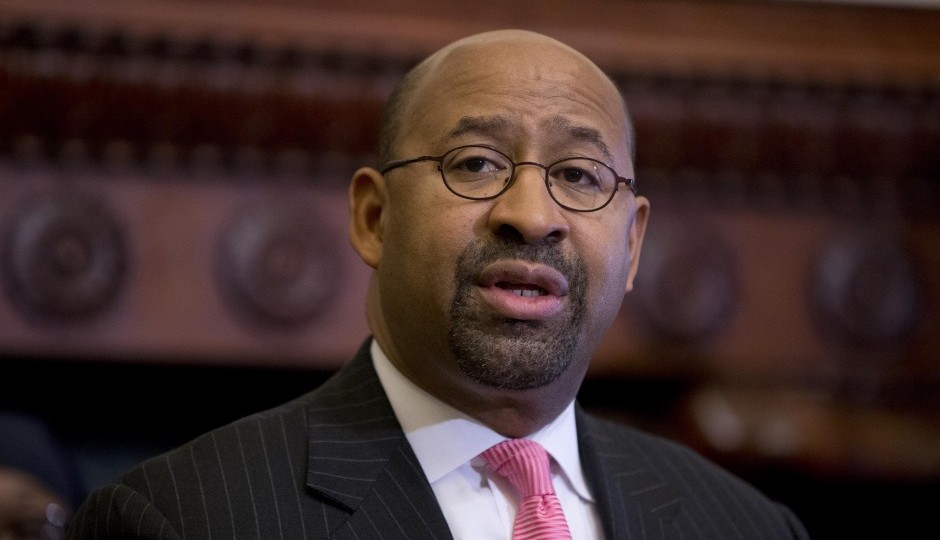The Brief: Are the Mayoral Candidates’ School Plans “Bogus”?
1. Mayor Michael Nutter said the candidates running to replace him have proposed “bogus” school funding plans.
The gist: Nutter made the attack while touring a city school with Gov. Tom Wolf last week. He said, according to the Inquirer, “You cannot run around this school, shake hands with students, take pictures, read to second graders, talk to middle schoolers, inspire high school students, and then when you’re back at your office comfortably not put forward the money that they need to educate their students. Let’s cut the phoniness. Let’s be serious about educating kids.”
The six Democratic mayoral candidates oppose Nutter’s proposal to raise an extra $105 million for the city’s schools by increasing property taxes by 9 percent. They’ve offered other plans to boost funding, such as hiking the liquor-by-the-drink tax and selling tax liens.
Why it matters: Nutter may have a point. Many of the candidates’ plans rely on action from Harrisburg and/or do not provide sustainable funding. But Nutter also has an agenda: His planned property tax hike is facing serious opposition on City Council. The fact that his proposal is being derided at mayoral forums across the city surely isn’t helping matters. Nutter’s comments to the press last week were likely an attempt to build support for his funding plan (or at least tamp down resistance to it) among residents.
2. An independent group supporting Jim Kenney has aired a TV ad featuring images of prominent black politicians that endorsed him.
The gist: Forward Philadelphia’s ad portrays photos of Council members Marian Tasco and Cindy Bass, as well as state Reps. Dwight Evans, Cherelle Parker and Stephen Kinsey. The narrator says, “Jim Kenney’s the one they trust.”
Why it matters: Tasco, Bass, Evans, Parker and Kinsey announced last week that they are backing Kenney. Citified noted that their endorsements could help Kenney win black support — something he desperately needs in order to win the mayor’s race — but not without hard work:
These endorsements have to be leveraged properly by Kenney in order to pay off. That means putting Tasco and Evans in pro-Kenney TV ads, as well as working within the Northwest ward structure to build up the Kenney campaign’s ground game.
What we should have said was, “These endorsements have to be leveraged properly by Kenney or an independent group supporting him in order to pay off.” The fact that Forward Philadelphia has highlighted Kenney’s endorsements in a TV ad before Kenney’s own campaign has underscores how powerful independent groups are in the mayor’s race. Yet again, they are overshadowing the campaigns themselves.
3. The City Council race has proven to be just as, if not more, interesting than the mayoral race. Perhaps that’s because nowadays, the fourth floor of City Hall is where all the action is.
The gist: Consider the fact that some candidates running for City Council — Allan Domb, Helen Gym, Paul Steinke — could have probably run for mayor if they had wanted to, but they didn’t.
Why did they go for City Council instead? Patrick Kerkstra has a superb piece on the rising clout of the city’s lawmakers. He writes:
The notion that the mayor calls the big shots in City Hall dates from the 1951 city charter, which gives the mayor broad authority to run the government and administer the budget, with minimal Council oversight. … In the half century after the charter was adopted, it was amended just once. But in the 13 years since then, the charter has been changed 42 times. That’s partly because the charter is showing its age, but the sheer volume of amendments also speaks to City Council’s growing dissatisfaction with the deal struck back in 1951. So there have been amendments mandating new budget processes for the mayor to follow, changes giving Council sway over minority contracting decisions, changes creating commissions or new government positions on jobs, youths, public-school families and disabled Philadelphians, to cite just a few examples. Then there are the charter changes that are introduced — or, in some cases, raised like political bludgeons — but never enacted, like the 2013 threat to force mayors to get Council approval before challenging union arbitration decisions. With the help of a City Hall insider, I counted at least 70 of those since 2000.
Seventy! Since 2000! But are the changing dynamics in City Hall a good thing?
Why it matters: Read Citified’s full analysis here.
